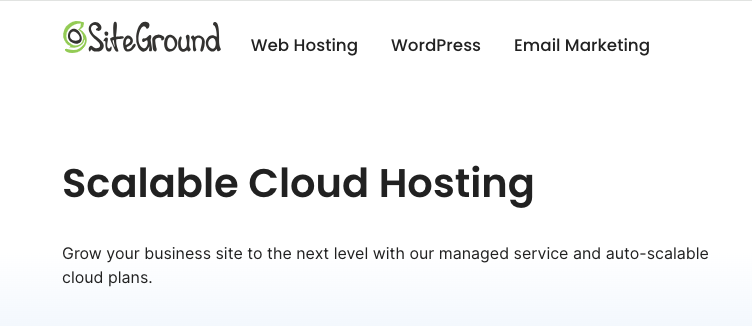If you're planning to build a website in 2025, cloud hosting is a smart option.
Cloud hosting has grown into a powerful and reliable hosting option for websites of all sizes, whether you're starting a personal blog or running a booming e-commerce site.
And the best part? You don’t need to be a technical expert to understand how it works.
In this blog, we will discuss the best cloud hosting service, its benefits, the top providers in 2025, and how to choose the right one for you.
What is Cloud Hosting?
Cloud hosting simply means that your website doesn’t live on just one server. Instead, it’s hosted on a network of interconnected servers that work together. Traditional hosting is like keeping your files on a single pen drive.
If that pen drive crashes, you lose everything. Cloud hosting, on the other hand, is like storing your files on Google Drive; even if one server fails, your data is still safe because other servers take over.
This network of servers shares the load.
So, if your site suddenly gets a lot of visitors, cloud hosting automatically adjusts and allocates more resources. You don’t need to move your site or upgrade your plan instantly. It scales with your needs.
That’s what makes it a favorite for growing businesses, bloggers, and developers alike.
Why Cloud Hosting is Popular in 2025
Let’s be honest.
The internet is bigger, faster, and more crowded than ever in 2025. More people are building websites. More businesses are going online. And more users expect lightning-fast load times and 24/7 availability.
This is exactly where cloud hosting shines.
First, it’s extremely reliable. Since your site isn’t tied to a single server, it doesn’t go down easily. Even if one machine crashes, others step in. That kind of high availability is gold, especially for online stores and services.
Next, there’s performance.
Cloud hosting is often powered by Content Delivery Networks (CDNs) and edge servers that serve data from the closest location to your visitor. That means faster loading times. Your users don’t have to wait, and you won’t lose them to slow speeds.
Another major reason cloud hosting is gaining popularity is its pricing flexibility. You’re not forced into a fixed-cost plan with limited resources.
Most cloud providers let you pay only for what you use (e.g., Cloudways).
If your traffic spikes this month and then drops next month, your bill will adjust accordingly. That’s way better than overpaying for resources you’re not using.
Benefits of Cloud Hosting(Explained)
Let's look into each benefit in a bit of detail.
1. Scalability
Suppose you're launching a new product and getting thousands of unexpected visitors overnight. With traditional hosting, your site might crash.
With cloud hosting, it just stretches its muscles and handles it like a pro. You get more resources right away, so no migration is needed.
2. Reliability
Your site data is stored across multiple servers, and it stays online even if one of them fails. This backup is key for keeping your site running smoothly 24/7.
3. Speed & Performance
Cloud servers use SSDs, modern infrastructure, and global data centers. Combined with CDNs, they load your site quickly, which is essential for both user experience and SEO rankings.
4. Security
Cloud hosting comes with strong firewalls, DDoS protection, isolated environments, and constant monitoring.
It’s usually safer than shared hosting, where one vulnerable website could risk all others on the same server.
5. Cost-Effective
Most cloud providers let you start small and scale. So you’re not paying a fortune from day one. As your site grows, so does your plan.
This model is especially helpful for startups and small businesses.
Cloud Hosting Features You Should Know
Not all cloud hosting is equal.
Some are beginner-friendly, while others require a bit more technical knowledge. When choosing your provider, look for these essentials.
- Uptime Guarantee: Aim for 99.9% or higher. Downtime means lost visitors and revenue.
- Customer Support: You want help when things go wrong. 24/7 live chat or ticket support is a must.
- Easy-to-use Dashboard: Whether it’s cPanel or a custom panel, the user interface should be clean and beginner-friendly.
- Freebies: SSL certificates, daily backups, free migrations, and domain registration are big wins.
- Transparent Pricing: No hidden fees. Clear billing is a must.
- Global Servers: Your provider should have data centers across continents to offer the best speeds to your visitors.
- Auto-scaling: The system should detect high traffic and automatically adjust resources.
Now, let’s talk about the top cloud hosting providers in 2025.
Best Cloud Hosting Services(Providers) in 2025
Let's look into the top cloud hosting provider that you should know in 2025.
Hostinger Cloud Hosting

Hostinger is one of the most beginner-friendly providers. It gives you a custom dashboard that’s super easy to use.
You also get a free domain, free SSL, SSD storage, and good performance for a surprisingly low price. It's ideal for bloggers, freelancers, and small businesses starting out.
If you plan to use Hostinger's shared hosting, use this Hostinger Coupon Code to get up to an 80% discount. Pricing starts at $9.99 per month.
Here is the comparions of Bluehost Vs Hostinger and learn abouut the 8 Hostinger benefits that every beginner and Hostinger users should know.
Cloudways Hosting

Cloudways isn’t a traditional hosting provider, it’s a platform that lets you choose from cloud giants like AWS, Google Cloud, DigitalOcean, Linode, or Vultr.
Then it manages everything for you. No need to deal with command lines or server config. It's best suited for developers and growing teams who want performance without the hassle.
Use Cloudways Promo Code to get an exclusive discount of up to 30%.(Pricing starts at $14/month)
A2 Hosting Turbo Cloud

Speed is A2 Hosting’s main selling point. Their Turbo plans use NVMe storage and advanced caching to make your site load lightning-fast.
It's great for people who care about speed but don’t want to dive too deep into technical stuff. Plus, their support is solid. (Pricing starts at $11.99/month)
InMotion Hosting Cloud VPS

InMotion offers powerful VPS hosting on the cloud. It gives you root access, high performance, and the ability to scale.
While it’s slightly more technical, it's a fantastic choice for growing websites that need more control and resources. (Pricing starts at $5/month)
SiteGround Cloud Hosting

SiteGround is known for its excellent customer support and reliability.
Their cloud plans are fully managed and auto-scalable. They’re more expensive, but they deliver enterprise-grade hosting.
Ideal for websites expecting heavy traffic. (Pricing starts at $100/month)
Digital Ocean

DigitalOcean is for developers who want full control. It gives you raw computing power and developer tools to build anything from a blog to a custom app.
If you’re comfortable with server management or using it via Cloudways, it’s an affordable and powerful option.(Pricing starts at $5/month)
Which Cloud Host Should You Choose?
Here’s how to decide:
- If you're a developer or agency looking to build multiple projects, Cloudways or DigitalOcean will give you the flexibility and scalability you need.
- If you’re a complete beginner or just starting a blog, go with Hostinger. It’s simple, affordable, and comes with everything you need.
- If you want fast speed and better performance without much technical work, A2 Hosting is a solid choice.
- If your site runs on WordPress and you want it to be fully optimized, WP Engine is built just for you.
- If you’re running a business website or expect to scale soon, InMotion or SiteGround gives you more power and control.
FAQs
The following are the frequently asked questions about cloud hosting.
1. Is cloud hosting better than shared hosting?
Yes. Cloud hosting offers better speed, uptime, and scalability.
2. Do I need technical skills?
No, most cloud hosts provide easy dashboards. But developers can go deeper if they want.
3. Can I host WordPress?
Not necessarily. Some plans start at $5/month. It depends on the features and provider.
Conclusion
Cloud hosting isn’t just a trend, it’s the future. In 2025, with more websites competing for attention, you need something fast, reliable, and scalable.
Whether you're running a personal blog, starting an online store, or managing client websites, there's a cloud host that fits your needs.
Don’t get overwhelmed by the choices; just start with something beginner-friendly that grows with you.
And remember, it’s not about choosing the most expensive host, it’s about choosing the one that fits your goals.
Hopefully, this guide helped make cloud hosting easier to understand.
If you still have questions or want personalized recommendations, drop them in the comments below.

